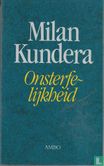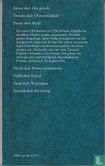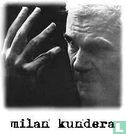Milan Kundera (Brno, April 1, 1929) is a Czech writer. He has lived in France since 1975. He was also a lecturer in comparative literature at the University of Rennes.
In his work he is humorous, cynical and there seems to be a somewhat melancholic undertone. He writes a lot about the situation in his native country since communism. He thereby connects personal histories with philosophical themes, without becoming pedantic. Although he expresses a Czech tradition of emotional deepening, he has been writing in French since 1989. His first novel 'De Grap' is characteristic of his cynical humor. The novel 'Immortality' is one in which both composition and content are indicative of all of Kundera's work. The composition is often one of varying points of view from different individuals, forcing the reader to delve into the psyche of these individuals, but enabling the reader to maintain a contemplative distance. This reflection is then fed between the lines by Kundera's reflections. You could call him an existentialist whose hope is gone; some also call him a postmodernist.
One of Kundera's most famous works is The Unbearable Lightness of Being; a philosophical novel in which the author takes the reader into the minds of four protagonists, with different backgrounds and ideas, who all try to organize their lives in their own way. From different perspectives, matters such as coincidence and predestination, politics, art, love, sex, kitsch and of course the lightness of being.
Dvorácek affair:
In October 2008, historian Adam Hradilek of the Institute for the Study of Totalitarian Regimes in Prague drew attention in an article in the renowned Czech weekly Respekt to a document in the archives of the secret police, which appears to show that the then 20-year-old Kundera in 1950 reported a 22-year-old anti-communist activist, Miroslav Dvorácek, to the police. Dvorácek was sentenced to 22 years in prison, 14 of which he actually served, in part in uranium mines that were very damaging to the health of the forced laborers.
Kundera himself denies being guilty of Dvorácek's charges, but historians consider it unlikely that the police report would be a forgery. Some commentators believe the accusation is correct and believe that this incident sheds new light on Kundera's "obsession" with the darker sides of the communist past.
According to other reports, the report would have been made by a colleague of Milan Kundera and for some obscure reason Kundera's name would have been mentioned in the police report.
Bibliography:
The Joke (novel, 1967)
Laughing loves (stories, 1959-1968)
Life Is Elsewhere (novel, 1969)
Farewell Waltz (novel, 1970)
Jacques and his master (theater, 1971)
The Book of Laughter and Forgetting (novel, 1978)
The Unbearable Lightness of Being (novel, 1984)
The Art of the Novel (essay, 1986)
Immortality (novel, 1988)
Betrayed Wills (essay, 1993)
The Slowness (novel, 1995)
Identity (novel, 1997)
Ignorance (novel, 2002)
The Canvas (essay, 2005)
This text has been translated automatically from Dutch
Click here for the original text
Milan Kundera (Brno, 1 april 1929) is een Tsjechisch schrijver. Hij woont sinds 1975 in Frankrijk. Hij was daar tevens docent vergelijkende literatuurwetenschap aan de Universiteit van Rennes.
In zijn werk is hij humoristisch, cynisch en lijkt er een wat melancholische ondertoon te zijn. Hij schrijft veel over de situatie in zijn geboorteland sinds het communisme. Hij verbindt daarbij de persoonlijke geschiedenissen met filosofische thema's, zonder belerend te worden. Hoewel hij uitdrukking geeft aan een Tsjechische traditie van emotionele verdieping is hij sinds 1989 in het Frans gaan schrijven. Zijn eerste roman 'De Grap' is tekenend voor zijn cynische humor. De roman 'Onsterfelijkheid' is er een waarbij zowel de compositie als de inhoud tekenend is voor al het werk van Kundera. De compositie is er vaak een van wisselende gezichtspunten vanuit verschillende individuen, waarbij de lezer gedwongen wordt zich in de psyche van deze individuen te verdiepen, maar in staat gesteld wordt om een beschouwende afstand te bewaren. Deze beschouwing wordt dan tussen de regels gevoed door Kundera's bespiegelingen. Je zou hem een existentialist kunnen noemen bij wie de hoop vervlogen is; sommigen noemen hem eveneens een postmodernist.
Een van Kundera's bekendste werken is De ondraaglijke lichtheid van het bestaan; een filosofische roman waarin de auteur de lezer meeneemt in de hoofden van vier hoofdrolspelers, met verschillende achtergronden en denkbeelden, die allemaal hun bestaan op een eigen manier proberen in te richten. Vanuit verschillende perspectieven worden zaken als toeval en voorbestemming, politiek, kunst, liefde, seks, kitsch en natuurlijk de lichtheid van het bestaan behandeld.
Affaire Dvorácek:
In oktober 2008 heeft de historicus Adam Hradilek van het Instituut voor de bestudering van totalitaire regimes in Praag in een artikel in het gerenommeerde Tsjechische weekblad Respekt de aandacht gevestigd op een document in de archieven van de geheime politie, dat lijkt aan te tonen dat de destijds 20-jarige Kundera in 1950 een 22-jarige anticommunistische activist, Miroslav Dvorácek, bij de politie heeft aangegeven. Dvorácek werd veroordeeld tot 22 jaar gevangenisstraf, waarvan hij er 14 daadwerkelijk heeft uitgezeten, voor een deel in de voor de gezondheid van de dwangarbeiders zeer schadelijke uraniummijnen.
Kundera zelf ontkent schuldig te zijn aan de aangifte van Dvorácek, maar historici achten het onwaarschijnlijk dat het politierapport een vervalsing zou zijn. Sommige commentatoren gaan uit van de juistheid van de beschuldiging en zijn van mening dat dit voorval Kundera's "obsessie" met de duistere kanten van het communistisch verleden in een nieuw licht plaatst.
Volgens andere berichten zou de aangifte gedaan zijn door een collega van Milan Kundera en zou om een of andere duistere reden de naam van Kundera in het politierapport zijn vermeld.
Bibliografie:
De grap (roman, 1967)
Lachwekkende liefdes (verhalen, 1959-1968)
Het leven is elders (roman, 1969)
Afscheidswals (roman, 1970)
Jacques en zijn meester (theater, 1971)
Het boek van de lach en de vergetelheid (roman, 1978)
De ondraaglijke lichtheid van het bestaan (roman, 1984)
De kunst van de roman (essay, 1986)
Onsterfelijkheid (roman, 1988)
Verraden testamenten (essay, 1993)
De traagheid (roman, 1995)
Identiteit (roman, 1997)
Onwetendheid (roman, 2002)
Het doek (essay, 2005)











